| Use
Explorer for a better display of this Website |

Joining Together to Wish
Smooth Sailing for Ferry Run on Soybeans
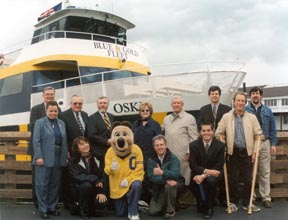 |
| The
Gang’s All Here: the people behind the ferry biodiesel project
more or less left to right: Tom Bertken (CEO of the WTA), Mary
Frances Culnane (Marine Engineer, WTA), Mayor Al Boro of San
Rafael (WTA Board Member, also on the Golden Gate Bridge
District Board), Ron Duckhorn (President, Blue & Gold
Fleet), Teri Shore (Bluewater Network), "Oski" (as
himself), Charlene Haught-Johnson (President, WTA), Capt. Frank
Johnson (MARAD Western Region Director), Michael Murphy (Bay
Area Air Quality Management District), Graham Noyes (World
Energy), Wade Crowfoot (Aide to San Francisco Supervisor Aaron
Peskin), Paul Milkey and John Lee (both of the California Air
Resources Board) |
What do representatives
from air quality regulatory agencies; entrepreneurial business; a ferry
operation; local, state and federal government; an environmental group;
and the Cal mascot "Oski" all have in common? On the afternoon
of November 13, they all got together to talk about the first time that
a passenger vessel has been run on biodiesel made from soybeans. Cal’s
"Oski" mascot added a note of whimsy to this otherwise
technical briefing and, as you can see, was a great photo prop.
This project required the
collaboration of three great partners. The Water Transit Authority
sought and obtained a $25,000 grant from the U.S. Department of
Transportation’s Maritime Administration (MARAD). Blue & Gold
Ferry Service provided $57,000 in additional funding and dedicated its
400-passenger excursion ferry, the Oski, namesake of the Cal
mascot, to run on biodiesel for five months.
| The
Business of Biodiesel
Two unlikely business partners in
this mix: Ron Duckhorn, seasoned President of Blue & Gold
Fleet, the Bay Area’s largest provider of ferry and water
excursion services and wide-eyed Graham Noyes, entrepreneur
supplier of World Energy’s biodiesel.
In describing his job at World
Energy, Mr. Noyes said that he deals with "a series of
naysayers," in convincing them that biodiesel is a clean
and viable fuel option. By way of business incentives, Mr. Noyes
said that Texas and Hawaii offer government tax incentives to
cover the incremental costs of biodiesel fuel. California has
only gotten as far as recognizing the legality of using
biodiesel as fuel: it is necessary to get a certificate of
emissions reductions before the state will be able to offer
incentives. The European Community also offers biodiesel tax
incentives.
Although a tax break would be one
way to make smart business of biodiesel use, Ron Duckhorn
characterized Blue & Gold’s interest by saying that it was
"great to do something positive. We move people. As a
business-person, this is good business. A huge percentage of
people are interested in environmentally responsible
operations."
Coming in
January
"Circle Routes and Island
Hopping" – a Bay Crossings exclusive story on
recreational ferry trips around San Francisco Bay. Read about
research underway by the GGNRA and the Water Transit Authority
to provide fun links to Angel Island, Alcatraz, Ft. Mason, Ft.
Baker, Pac Bell Park, Berkeley, Oakland and the Presidio. Not
just for tourists but for local residents too! |
Captain Frank Johnston,
representing MARAD, modestly downplayed MARAD’s collaboration. Facing
Ron Duckhorn, President of Blue & Gold Fleet, Captain Johnston said,
"All the kudos belong to those with the vision. We hope this is
just a start and that other vessels will pick up on it. Thank you, Ron,
for being a leader."
 |
 |
| Above,
Mary Frances Culnane of the WTA points out the business end of
ferryboat Oski, the exhaust pipe. According to Culnane,
one bushel of soybeans makes one and a half bushels of biodiesel.
It’s said to smell like food frying Left, "Oski"
smells soybeans: regulators and environmentalists behind the
biodiesel soybean project by the exhaust of ferryboat Oski |
Thomas G. Bertken, the
Water Transit Authority’s CEO, said that the Water Transit Authority
was "thrilled to be partnering on this project," and that he
hoped that the data collected during this project would be useful to
regulatory agencies. For instance, the WTA will be testing, for the
first-time-ever, baseline emissions from an in-service passenger vessel
using protocol accepted by regulatory agencies.
Mary Frances Culnane, the
Water Transit Authority’s Manager for Marine Engineering used a
power-point presentation while explaining that Biodiesel is thought to
produce less emissions than conventional diesel (except for NOx); the
WTA will be monitoring emissions during the ferry pilot project to see
how they compare. Jon Hie, Blue & Gold’s VP of Engineering and
Facilities explained that, on November 5, Oski began using an
innovative technology, Continuous Water Injection, to reduce NOx
emissions. By misting water into the engine’s combustion chamber, this
technology cools the combustion temperature, thus reducing NOx formation
which occurs at higher cylinder temperatures. He also praised biodiesel
as a "fill and go," technology, which requires no expensive
alterations to existing engines.
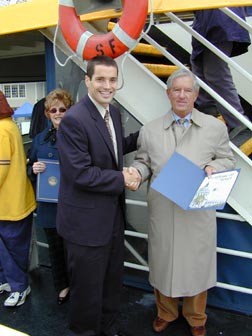 |
| Filling
in for San Francisco Supervisor Aaron Peskin, Aide Wade Crowfoot
(left) presents a proclamation in tribute to the soybean fuel
project to Frank Johnston of MARAD |
Graham Noyes, Director of
the biodiesel supplier, World Energy arrived on the scene in his
Volkswagen Jetta fueled by biodiesel. Appropriately, just before lunch,
Mr. Noyes offered samples of the biodiesel to attendees. Though some may
have been tempted to drink it as an appetizer, they were warned that it
would have an effect on digestion similar to castor oil.
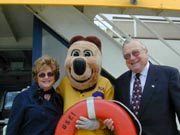 |
| Charlene
Haught-Johnson of WTA, Oski and Mayor Al Boro of San Rafael |
Paul Milkey, hailing from
Sacramento’s California Air Resources Board to attend, said that the
diesel reduction plan with CARB fits nicely with the attributes of
biodiesel. John Lee, also from CARB, added that biodiesel is a misnomer.
Since it is not really a diesel, it contains no diesel
particulates.
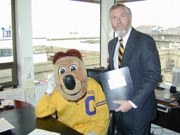 |
| Ron
Duckhorn, President of Blue & Gold, posing with Oski,
explained that the ferry operator’s affiliation with Cal began
in 1978 as a response to Red & White Ferry’s affiliation
with Stanford. |
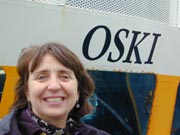 |
| A
content Teri Shore of Bluewater Network, the environmental
activist group which has long advocated for
environmentally-friendly technologies like biodiesel. |
 |
| Veronica
Sanchez, Manager, Community & Government Relations for WTA,
with Ron Duckhorn of Blue and Gold. |
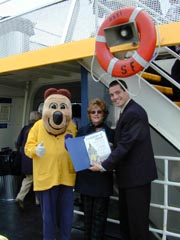 |
| Supervisor
Aaron Peskin’s Aide Wade Crowfoot with WTA President Charlene
Haught-Johnson |
|